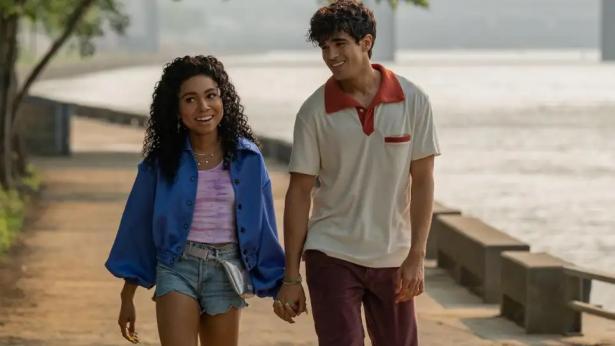It’s hard to overstate the significance of a film like Anything’s Possible receiving anything akin to a mainstream release. In a time when an unprecedented wave of anti-transgender legislation is sweeping through state legislatures, stories of trans experience are vital and necessary. Though one might hope that empathetic representation might humanize trans folks in the eyes of their oppressors, the value of a story like this one is self-evident to trans teenagers and their allies who otherwise do not see their experiences portrayed on screen, much less in an age of pluralized culture where there’s plenty of room to cater to every audience. This doesn’t give Anything’s Possible a free pass in terms of quality—and there are certainly aspects of Billy Porter’s feature directorial debut that don’t quite work—but screenwriter Ximena Garcia Lecuona crafts such a sweet coming of age tale that it’s easy to celebrate the film’s plentiful merits.
Our protagonist Kelsa (Eva Reign) opens the film with a voiceover meditation on the ways in which over millennia, various animals developed unique mechanisms for survival—a direct parallel to the ways in which she and her classmates expect to adapt to their high school senior year. This Mean Girls pastiche quickly falls away after Kelsa experiences an art class meet-cute with Khal (Abubakr Ali), whose skill as a painter is matched only by his easy-going humor and charm. They develop a mutual crush that blossoms into a relationship which puts their other friendships to the test, while simultaneously giving Kelsa and Khal the emotional freedom to be seen—including by themselves—for who they truly are.
A crucial part of Kelsa’s perspective is her determination that her transgender identity is an important part of who she is and how she interacts with the world, but it’s not the only thing that defines her. She’s funny, flirty, and ambitious, dreaming of a future at a college outside of her hometown of Pittsburgh. The film does a superb job of dramatizing that conflict between her desire to be seen as an individual and the world’s desire to pigeonhole her because of her gender, but that’s one of a number of unique struggles that Kelsa faces as a trans teenager. The movie especially emphasizes the teen element of that identity, so that even though this is a story specifically about transness, its themes resonate to anyone growing up and learning to find the confidence to love oneself, much less love someone else.
This, in turn, makes Khal a perfect foil to Kelsa. He makes no outwardly bigoted assumptions about his girlfriend and always strives to be kind, but also doesn’t always know how best to be an ally or to support Kelsa through the bigotry of their classmates. But much like Kelsa, he wants to create his own future, shirking his parents’ expectations of attending a four-year college education to instead pursue a trade that he might find more personally and artistically fulfilling. Ultimately, his personal growth comes from confidently and unreservedly pursuing his attraction of a woman whom others around him see as a novelty, or a lighting rod for “woke points,” whom his best friend Otis (Grant Reynolds) can’t comprehend being desirable to a straight man.
Unfortunately, that’s about as far as Otis’ character is allowed to develop, and this shallowness exemplifies the majority of Anything’s Possible’s supporting cast. Most of the named characters don’t have much personality or drive beyond their utility to the plot before they are unceremoniously abandoned in the third act, resolving their particular plot threads mostly by implication. Khal leaving his bigoted bestie in the dust may be thematically appropriate, but subplots regarding Kelsa’s BFFs Em (Courtnee Carter) and Chris (Kelly Lamor Wilson) feel underexplored and unresolved.
In particular, Em’s sense of betrayal after Khal pursues Kelsa instead of her leads to a vengeful manipulation of school policy to get Kelsa banned from the women’s locker room, a development that gets resolved too cleanly, as does the film’s callout of Chris’s self-centering, performative allyship. That said, Renée Elise Goldsberry stands out among the supporting performers as Kelsa’s single mother, whose overprotective presence provides a grounding influence when the pressures of teenage drama threaten to overwhelm her daughter; in particular, she delivers a monologue that rivals Jennifer Garner’s turn in Love, Simon in terms of supportive parent wish fulfillment for queer kids.
Anything’s Possible - Official Trailer | Prime Video
Otherwise, it’s easy to chalk up the film’s shortcomings to zeroing in on the power of a singular romantic relationship as a catalyst for growth for the people within it. In between director Billy Porter’s sporadic attempts at cutaway humor—which range from laugh-out-loud hilarious to cringingly banal—he cultivates a genuine sense of connection that lets both Kelsa and Khal shine, amplifying the significance of the “romantic” part of this rom-com. Eva Reign and Abubakr Ali have palpable on-screen chemistry—not always necessarily sexual, but infused with the kind of awkward, rambling sincerity that makes first loves so powerful. The film’s epilogue, in particular, feels revelatory, meditating on relationships in a way that few high school romances do, defining “happily ever after” on its own strikingly mature terms.
Anything’s Possible may be flawed for what it fails to fully develop around the edges of its story, but the central relationship that holds the film together is so compelling that the rest hardly matters. Not just a story about trans teenage survival, Ximena Garcia Lecuona has written a tale of communal thriving through love, allyship, and symbiotic personal growth. Anything’s Possible, far from a cynical appeal to Gen Z wokeness, makes an impassioned call for empathy and understanding to which any viewer can relate, ultimately highlighting the universal truth that love is ultimately what allows us to be our best selves, trans or not.


Spread the word